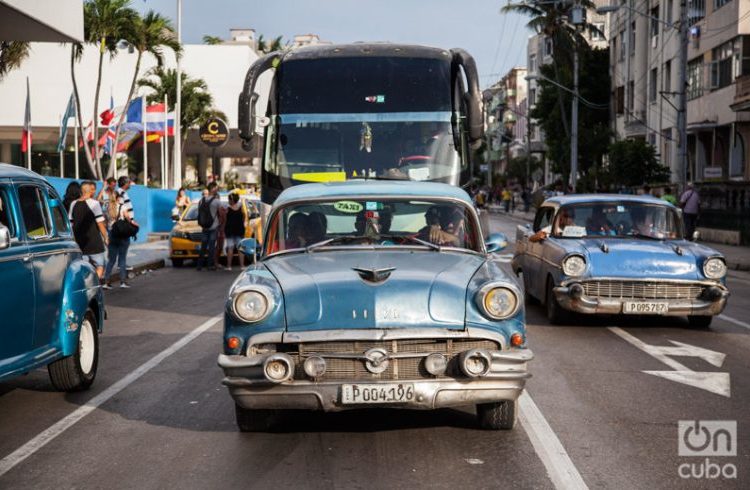The U.S. Department of the Treasury has updated its list of clarifications about the new Cuba policy. What was announced by President Donald Trump last June jeopardizes the regulations of that government agency and the Department of Commerce.
A list of “prohibited” Cuban “entities and subentities” must be issued by the Department of State, with an attached guide containing specifications and instructions. That would define much better the reach of the new restrictions, whose concrete impact is still impossible to assess.
The Office of Foreign Assets Control (OFAC) announces there will be changes in the definition of “prohibited members of the Cuban government” which can exclude some persons from receiving remittances. On the other hand and without greater detail, it adds to its list of previous questions and answers that certain “group educational travel categories” can be affected.
Travel under support for the Cuban people can be restricted, “as is established in the National Security Presidential Memorandum” signed by Trump on June 16 in Miami.
OFAC has still not specified the date for the release of the new regulations, although “it expects to issue its amendments in the coming months.” Moreover, it insists that “until the new rules are published,” U.S. travelers may continue to visit Cuba under 12 categories of permissible travel that were outlined during the Obama administration.
The specific changes corresponding to the Department of the Treasury will be made through amendments to its Cuban Assets Control Regulation (CACR); while the Department of Commerce will apply the necessary changes through amendments to its Export Administration Regulations.
GROUP TRIPS
“Group people-to-people travel is educational travel not involving academic study pursuant to a degree program that takes place under the auspices of an organization that is subject to U.S. jurisdiction that sponsors such exchanges to promote people-to-people contact,” OFAC explains.
To the conditions demanded for this category, the previous clarifications had added that the “travelers utilizing this travel authorization must maintain a full-time schedule of educational exchange activities that are intended to enhance contact with the Cuban people, support civil society in Cuba, or promote the Cuban people’s independence from Cuban authorities, and that will result in meaningful interaction between the traveler and individuals in Cuba. An employee, consultant, or agent of the group must accompany each group to ensure that each traveler maintains a full-time schedule of educational exchange activities.”
In addition, “the predominant portion of the activities engaged in by individual travelers must not be with prohibited officials of the Government of Cuba or prohibited members of the Cuban Communist Party (as defined in the regulations). Once OFAC issues the new regulations, new individual people-to-people travel will not be authorized.”
Moreover, it recalls that provided that the traveler has already completed at least one travel-related transaction prior to the announcement of the new policy on June 16, 2017, including those in the categories that will be prohibited or restricted by it-
The purchase of airline or cruise tickets will not be affected.
To date more Americans have traveled to Cuba than in all of 2016. At the close of May the figure of 284,000 visitors had already been surpassed. This Tuesday Cuba reached the three million tourists, 75 days ahead of the preceding year, and despite the restrictions in force and those announced by Trump, the United States is today one of the principal issuing markets.
AUTHORIZED REMITTANCES
The announced policy changes will not change the authorization to send remittances to Cuba, OFAC insists. In addition, they include an exception that will allow transactions related to the sending, processing and reception of authorized remittances if they are restricted in another way by the new measures on the transactions with certain identified Cuban military, intelligence or security services. As a result, the ability of sending or receiving authorized remittances.
However, according to the announcement of the Trump administration policy, changes will be introduced in the definition of prohibited members of the Cuban government that can exclude certain persons from receiving these remittances.
According to the Presidential Memorandum, this category would include the Council of State and the Council of Ministers; the members or employees of the National Assembly of People’s Power, the provincial assemblies and the Supreme Court; local heads of the Committees for the Defense of the Revolution, and high-ranking officials from all the Cuban state-run ministries and agencies. It also includes employees of the Ministry of the Interior and the Armed Forces; the secretaries of the Central Organization of Cuban Trade Unions and its member unions; and the editors in chief of the state-run media.
COMMERCIAL COMMITMENTS
The document confirms that the transactions with companies and subsidiaries linked to the Cuban military, intelligence and security services – prohibited by the new Cuba policy -, will be allowed “provided that those commercial engagements were in place prior to the issuance of the forthcoming regulations.”
For example, OFAC specifies, “businesses will be permitted to continue with transactions outlined in contingent or other types of contractual arrangements agreed to prior to the issuance of the new regulations, consistent with other CACR authorizations.”
Once the regulations are issued and the Department of State releases its list of entities and subentities with which direct transactions will not be authorized, new transactions can’t be made with them unless OFAC authorizes otherwise. The prior travel arrangements that can involve these entities or subentities will continue being authorized.
The 12 categories authorized by Barack Obama to travel to Cuba include:
Family visits; official business of the U.S. government, foreign governments, and certain intergovernmental organizations; journalistic activity, professional research and professional meetings; educational activities; religious activities; public performances, clinics, workshops, athletic and other competitions, and exhibitions; support for the Cuban people; humanitarian projects; activities of private foundations or research or educational institutes; exportation, importation, or transmission of information or information materials; certain export transactions that may be considered for authorization under existing regulations and guidelines.










